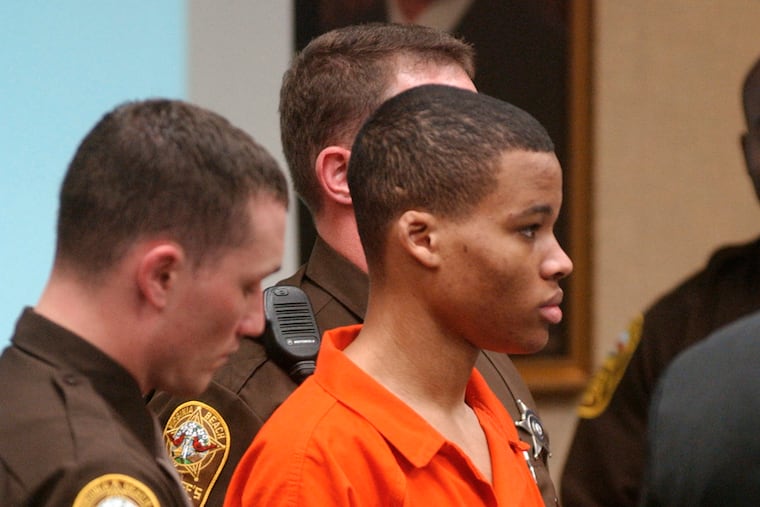D.C. sniper Lee Malvo withdraws Supreme Court case after Va. passes parole for juveniles
Virginia Democratic Gov. Ralph Northam signed legislation Monday which creates the possibility of parole for juvenile offenders serving life sentences, and convicted sniper Lee Boyd Malvo then dropped his request for a resentencing, which was pending before the U.S. Supreme Court.

Virginia Democratic Gov. Ralph Northam signed legislation Monday which creates the possibility of parole for juvenile offenders serving life sentences, and convicted sniper Lee Boyd Malvo then dropped his request for a resentencing, which was pending before the U.S. Supreme Court.
Malvo received four life sentences without parole for three Virginia slayings committed with John Allen Muhammad during the regional sniper rampage of October 2002. He received six additional life sentences, also without possibility of parole, for six more killings in Maryland during the same three-week period in 2002. The bill signed by Northam Monday would only affect Malvo's Virginia sentences. And it may clear the way for more resentencings of juveniles who received life sentences, since the challenge to that process by the Virginia attorney general is now gone.
The Supreme Court has ruled that defendants 17 years old and younger should not be sentenced to life terms without parole unless the judge has considered whether their crime "reflects unfortunate yet transient immaturity," or that the defendant is "the rare juvenile offender whose crime reflects irreparable corruption." Those exact criteria did not exist when Malvo was sentenced by a jury in December 2003, or by a Fairfax County, Virginia, judge in March 2004, and Virginia eliminated all parole in 1995.
So Malvo, now 35, sought a resentencing under those rulings, and won approval for a new sentencing in Virginia from both a federal district judge and a federal appeals court. Virginia Attorney General Mark Herring then appealed that to the U.S. Supreme Court, which accepted the case and heard oral arguments last October. A ruling was pending.
But a bill introduced by Del. Joseph Lindsey, D-Norfolk, which moved quickly through both the Virginia House of Delegates and Virginia Senate in about a month, states that "any person sentenced to a term of life imprisonment for a single felony or multiple felonies committed while the person was a juvenile and who has served at least 20 years of such sentence shall be eligible for parole and any person who has active sentences that total more than 20 years for a single felony or multiple felonies committed while the person was a juvenile and who has served at least 20 years of such sentences shall be eligible for parole."
Both the Virginia solicitor general and Malvo's lawyers then agreed to seek dismissal of the pending Supreme Court case, saying it was moot since the life without parole sentence no longer existed.
But there are more than 700 inmates in Virginia who were juveniles when sentenced to adult prisons. Malvo and 232 others would be eligible for parole in the next six years, according to the Virginia Department of Corrections.
Malvo then agreed not to seek resentencing, as the courts had granted him. This would leave the Fourth Circuit appeals court ruling from 2018, upholding Malvo's resentencing, as the applicable precedent for the mid-Atlantic states. There are 11 other people in Virginia prisons serving life sentences for crimes committed as juveniles.
Malvo has been in custody since October 2002, so he theoretically would be eligible for parole in October 2022, or in about 2 1/2 years. But he would then have to face his six life terms in Maryland. Malvo's lawyers in Maryland have sought a similar resentencing under the Supreme Court rulings, and that case is pending in federal district court.
"We've seen an incredible uptick in state legislatures banning life without parole for kids," said Jody Kent Lavy, executive director of the Campaign for the Fairf Sentencing of Youth, "and until now, Virginia has been woefully out of step with that national trend toward youth sentencing reform. . . . Children must be held accountable for their actions, and because they are fundamentally different from adults in their ability to assess risk and consequences, and their unique capacity for change, they should be held accountable in age-appropriate ways with a focus on rehabilitation and reintegration into society."
Of the roughly 2,800 prisoners who were serving juvenile life without parole when the Supreme Court ruled that new criteria must be applied to their cases, about 1,950 have been resentenced, and 545 have been released, according to the Campaign for Fair Sentencing for Youth. About 830 inmates are still serving juvenile life without parole terms, the group said in October.